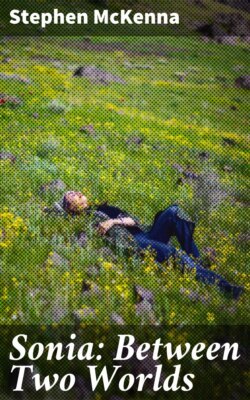Читать книгу Sonia: Between Two Worlds - Stephen McKenna - Страница 19
На сайте Литреса книга снята с продажи.
VI
ОглавлениеTable of Contents
Never have I known time pass so quickly as during that last year. Early in the Michaelmas term both Loring and I developed acute 'Schools-panic'; we barred ourselves inside '93D' and read ten hours a day, planning retreats in Cornwall for the vac., when we were to rise at dawn, bathe in the sea and work in four shifts of four hours each. The cottage was almost taken when a revulsion of feeling led us to adopt an attitude of melancholy fatalism. We said—what was true enough—that life under such conditions was not worth living; we added—what was less true—that we did not care whether we got firsts or fourths.
Gradually the door of '93D' was unbarred. We dined in Hall once or twice a week and attended clubs to eat dessert for which—as we were out of College—other people paid. The men of our year had by this time been infected with our own morbid state of conscience, but there were still happy second-year men without a care in the world, and freshmen who—so far as I could see—were living solely for pleasure.
In Oxford during springtime, with the chestnuts, lilac and laburnum blazing into colour, it is nothing short of sacrilege to read Select Charters and Documents of Constitutional History. As the evenings lengthened we used to find alfresco coffee-parties being held in a corner of Peck. I made the acquaintance of Summertown, an irrepressible freckled, red-haired little Etonian, the permanent thorn in the side of his father, Lord Marlyn, who was at this time Councillor of Embassy in Paris. It was his practice to drag a table, chairs and piano into the Quad and dispense coffee and iced champagne cup to all who passed. O'Rane would be found at the piano,—or on top of it with a guitar across his knees,—and the rest of us would lie back in long wicker chairs, gazing dreamily up at the scarlet and white flowers in the window-boxes, the flaky, grey-black walls, and far above them the early stars shining down from the darkening sky.
I had predicted that Raney's personality would impress itself upon Oxford, though I never underestimated the difficulty in a place so given over to particularism and fierce local jealousies. At this time the only men who had a reputation outside their own colleges were perhaps six in number: Blair of Trinity, who walked round Oxford of an afternoon with a hawk on his wrist; "Pongo" Jerrold, who kept pedigree bloodhounds; Granville, the President of the O.U.D.S.; Johnny Carstairs, who removed the minute hand from the post office clock in St. Aldate's every night of the Michaelmas term; and perhaps two more, of whom O'Rane was one. As so often, the world knew him for his accidents and overlooked his essence. He was quoted as a Union speaker of wild gesticulation and frenzied Celtic eloquence; as a pamphleteer and lampoonist who could seemingly write impromptu verse on any subject, in all metres and most languages; as the author of ninety-five per cent of "The Critic," a short-lived weekly started by Mayhew, who, I am convinced, would establish morning, evening, monthly and quarterly periodicals the day after being washed up on the beach of a desert island.
Inside the College he was chiefly famed for turbulence, invective and irreverence. "Lord, he hath a devil," is supposed to have been the comment of one Censor: he certainly had more than one man's vitality. With his faculty of omnipresence, he was known to all, though he could show little hospitality and was averse from appearing too often at the table of others. Indeed we could only get him round to 93D High Street on presentation of an ultimatum, and it was useless to trouble over the arrangement of a dinner, as he was then—as always—sublimely indifferent to all he ate and drank. The only hunger he seemed to know was the hunger for self-expression, and he gratified it with tongue and pen in his work, his friendships and his animosities. These last were short-lived, but as violent as if he were still the unreclaimed 'vengeful Celt' of schooldays, and, as at Melton, he was usually to be found carrying on a shower-and-sunshine quarrel with one or other member of Senior Common Room.
"Sacre nom de chien!" he roared to heaven as we crossed Tom Quad one night after dining at the High Table. "They are children and snobs and spiteful old women! Little Templeton, your loathly tutor, wears a dog collar and expounds the Gospel of Jesus Christ, first of the Sansculottes, who regarded not the face of a man." He drew a fresh breath and gripped me by the lapels of my coat. "The beast drowned me in Upper Ten shop the livelong night. 'E'm effreed E'm a little leete, Mister O'Reene. Lard Jarn Carstairs' affection for the perst office clerck makes it herd to be punctual.' Then anecdotes of Rosebery as an undergraduate and the everlasting Blenheim Ball! A bas les snobs!" He seized a stone and flung it madly at the window of the Professor of Pastoral Theology. "And they all worked off horrid little academic scores on some poor devil at Queen's who had the hardihood to publish a History of War and trespass on their vile preserves. Conspuez les accapareurs!" His voice rose with a vibrant, silver ring, and through the archway from Peck came a roar of welcome with bilious imitations of a view-hallo. "Summertown must be giving a coffee-binge," he announced. "Come and sing to 'em, George!
